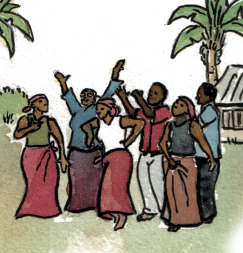(11) The Way We Were
“Manners also reflected our preoccupation with things British. Eating had form. It was something done with knife, fork and spoon seated on chairs around a table. Food was introduced into the mouth with the aforementioned tools. Food was not eaten with the hands, on the run, while walking, while playing, and especially not on the roads and thoroughfares of the city, where the disapproving eyes of family friends could makes judgments about our lack of decorum. “
The manner of eating was also prescribed. One had to chew with closed mouth, making no audible sounds, and with enough duration to render the mouthfuls a certain consistency. “Cut and swallow” or rough, rudimentary or approximate chewing, where morsels were still too chunky was another of the many pitfalls that our brutish ancestors or the devil lay as temptations to lead us from the straight and narrow, upper class European way.
 In matters religious, our spiritual correctness prescribed that understated devotion was to be preferred to excessive displays and religious passion, a certain formalism more cultivated than frequent interruptions of “amens” and “hallelujahs.” Calls and responses from the Pastor to the congregation had to be of the more formal kinds, prescribed and written down in a predictable, sober and routinized fashion, unvarying and free from the caprices of sudden inspiration or spontaneous outbursts. The free form, improvised religious inebriation, the so called “pocomania” reminiscent of the worship of Black Southern Baptists, was suspect. They appeared to be having way too much fun, singing in an undisciplined and exaggeratedly animated way, with harmonies too fluid and attractive, clapping excitedly, swaying, shaking and dancing suggestively in the house of God. Having too much fun in Church was definitely a practice of a peasant culture and as such to be avoided.
In matters religious, our spiritual correctness prescribed that understated devotion was to be preferred to excessive displays and religious passion, a certain formalism more cultivated than frequent interruptions of “amens” and “hallelujahs.” Calls and responses from the Pastor to the congregation had to be of the more formal kinds, prescribed and written down in a predictable, sober and routinized fashion, unvarying and free from the caprices of sudden inspiration or spontaneous outbursts. The free form, improvised religious inebriation, the so called “pocomania” reminiscent of the worship of Black Southern Baptists, was suspect. They appeared to be having way too much fun, singing in an undisciplined and exaggeratedly animated way, with harmonies too fluid and attractive, clapping excitedly, swaying, shaking and dancing suggestively in the house of God. Having too much fun in Church was definitely a practice of a peasant culture and as such to be avoided.
The manner of eating was also prescribed. One had to chew with closed mouth, making no audible sounds, and with enough duration to render the mouthfuls a certain consistency. “Cut and swallow” or rough, rudimentary or approximate chewing, where morsels were still too chunky was another of the many pitfalls that our brutish ancestors or the devil lay as temptations to lead us from the straight and narrow, upper class European way.

0 Comments